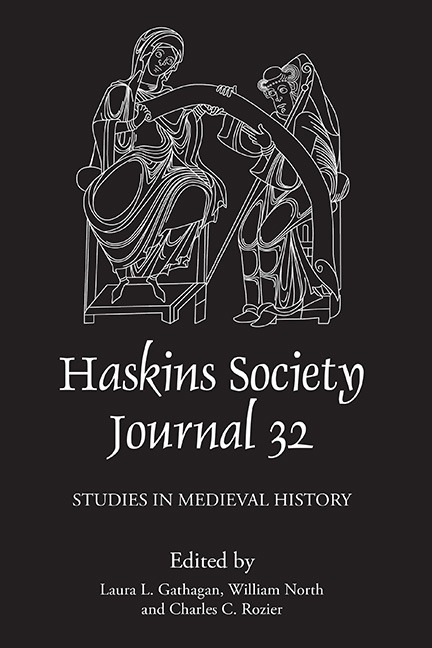Book contents
- Frontmatter
- Contents
- List of Illustrations
- Editors’ Note
- Abbreviations
- 1 Nearly-Not Miracles of the Carolingian Era: A Hypothesis
- 2 Noble Fathers and Low-Status Daughters in the Eleventh Century: Rilint, libera, and Hiltigund, presbyterissa
- 3 The Norman Conquest of England, the Papacy, and the Papal Banner
- 4 Ostmen, Normans, or Norwegians? Names and Identities in the Irish Sea World c. 1100
- 5 The Origins of Administrative Lordship in Medieval Flanders: A Reassessment
- 6 Multiple Allegiance and Its Impact: England and Normandy, 1066–c. 1204
- 7 The Wiley Lecture: Monsters in Anglo-Norman Historiography; Two Notes on William of Newburgh’s Revenants
- 8 A Female King or a Good Wife and a Great Mother? Seals, Coins, and the Epitaphic Legacy of the Empress Matilda
- 9 Harangue or Homily? Walter Espec, Deuteronomy, and the Renewal of the Covenant in Aelred of Rievaulx’s Relatio de Standardo
- 10 Anger Management: Modeling Christian Kingship in Peter of Blois’s Dialogus
- 11 In His Name: Religion as Administrative Strategy in Thirteenth-Century Champagne (and Navarre?)
- 12 Warhorse Markets and Social Status of Combatants under Edward I of England, 1296–1307
6 - Multiple Allegiance and Its Impact: England and Normandy, 1066–c. 1204
Published online by Cambridge University Press: 19 May 2022
- Frontmatter
- Contents
- List of Illustrations
- Editors’ Note
- Abbreviations
- 1 Nearly-Not Miracles of the Carolingian Era: A Hypothesis
- 2 Noble Fathers and Low-Status Daughters in the Eleventh Century: Rilint, libera, and Hiltigund, presbyterissa
- 3 The Norman Conquest of England, the Papacy, and the Papal Banner
- 4 Ostmen, Normans, or Norwegians? Names and Identities in the Irish Sea World c. 1100
- 5 The Origins of Administrative Lordship in Medieval Flanders: A Reassessment
- 6 Multiple Allegiance and Its Impact: England and Normandy, 1066–c. 1204
- 7 The Wiley Lecture: Monsters in Anglo-Norman Historiography; Two Notes on William of Newburgh’s Revenants
- 8 A Female King or a Good Wife and a Great Mother? Seals, Coins, and the Epitaphic Legacy of the Empress Matilda
- 9 Harangue or Homily? Walter Espec, Deuteronomy, and the Renewal of the Covenant in Aelred of Rievaulx’s Relatio de Standardo
- 10 Anger Management: Modeling Christian Kingship in Peter of Blois’s Dialogus
- 11 In His Name: Religion as Administrative Strategy in Thirteenth-Century Champagne (and Navarre?)
- 12 Warhorse Markets and Social Status of Combatants under Edward I of England, 1296–1307
Summary
Multiple allegiance, namely an individual having allegiance to more than one lord simultaneously, has long been overlooked in the historiography of the central Middle Ages. Although there are frequent references to and instances of the practice in charters, legal treatises, and chronicles, the historiography of multiple lordship in Anglophone and Continental works generally sees the practice as marginal, or as socially damaging. The reason for this historiographical treatment seems to be derived ultimately from the underlying framework of ‘feudalism’, which was ubiquitous for much of the twentieth century in Anglophone historiography, and is still present in much Continental work. While precise definitions of the term vary, one of the central tenets is the organization of a society around the bond of allegiance between a man and a lord. Multiple lordship was thus a force than ran counter to the ‘proper’ functioning of society. In order to make it fit with this assumed model, it could thus only be an occasional occurrence, or was a sign that social structures were breaking down.
Much of this attitude towards multiple lordship, as with much else related to what historians have called feudal, seems to derive from Marc Bloch's Société Féodale (1939). It included a short chapter to multiple lordship, ‘L’homme de plusieurs seigneurs’, in which Bloch framed it as a kind of social and even moral decline. Society was, for him, predicated on the bond between a man and his single lord. This system was undermined by the greed of knights, who eroded the idea of giving wholehearted service to one lord by taking on additional lords in order to gain more lands. For Bloch, this was ‘un abus’ that precipitated the collapse of the entire feudal social system, despite noting that multiple lordship of this type was present from the late ninth century onward.
Bloch's ideas echo down in subsequent Francophone works. For Jean-François Lemarignier, ‘hostile clienteles, raised up by the play of successive allegiances, bred a growing anarchy’. François Olivier-Martin took a similar view: multiple vassalage caused ‘déformations’ in the original system of vassalage. François-Louis Ganshof, whose work in many ways represents the high water mark of feudalism as an analytical framework, offered less of a moralizing perspective on the practice, but otherwise followed Bloch closely.
- Type
- Chapter
- Information
- The Haskins Society Journal 32 2020 Studies in Medieval History , pp. 115 - 132Publisher: Boydell & BrewerPrint publication year: 2021

